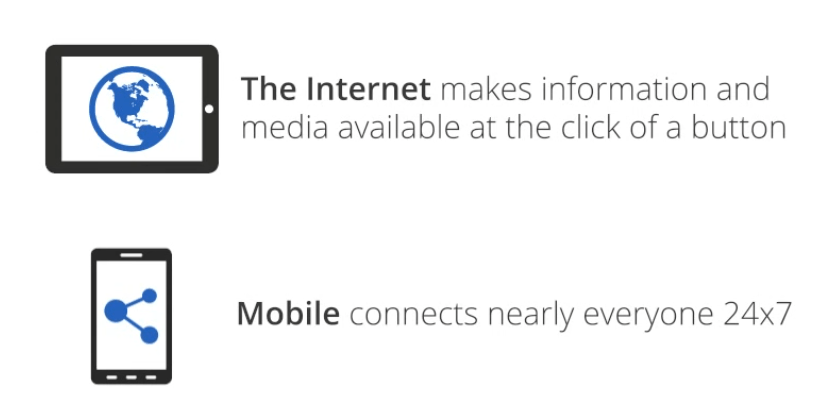
The Internet and connected mobile phones are making eCommerce grow faster than ever. In the recent years, the Internet has been taken over every aspect of our lives, even commerce – the ancient practice of selling and buying – is not out of this trend. That is where e-Commerce comes into place. At the beginning, e-commerce was driven by business to customers (B2C) transaction. Then, Business to business go to the internet too and e-commerce began to grow faster than ever. The next factor that fuels the acceleration of e-commerce is the fast development of mobile technology. Nowadays, smartphones are connecting everyone nearly 24/7, 365 days per year. A new concept arrives: Mobile commerce or m-commerce is forecasted to be the main sort of mobile in the next few years. By the year of 2020, 45% of the $632 billion in total e-commerce sales will be occupied by m-commerce.
Let’s not forget the fact that startups are more and more interested in e-commerce, many of them make the Internet their main marketplace. Hence, a generation of new eCommerce businesses arise. And, like any other kind businesses, eCommerce businesses have their own marketing method, that is what we will discuss in the next part of this article.
Digital Marketing in eCommerce
Definition of Digital Marketing
The most simple definition of digital marketing is the practice of market products or services using digital channels to reach customers (businesses or consumers). But most experts believe that ‘digital’ is not just yet another channel for marketing. For this, a whole new approach to marketing and a new understanding of customer behavior are required. For example, companies need to analyze and quantify the value of downloads of apps on mobile devices, tweets on Twitter, likes on Facebook and so on.
Although the internet is the most important part of it, digital marketing extends beyond internet marketing to include channels that do not require the use of the internet. Some of those channels can be listed as following: mobile phones (both SMS and MMS), social media marketing, display advertising, search engine marketing, and other forms of digital media.
E-Commerce businesses use digital marketing as their main marketing method. But why? What is so special about digital marketing that can differentiate it from traditional marketing? There are 3 main advantages of digital marketing over traditional method: Virality, Greater engagement, and Measurability.
Virality
Let me ask you a question: How often do your flyers get passed around by your potential customers? Almost never!
It is because too much effort is required to share a flyer with friends and family. By contrast, in an online world, a good content will go viral instantly. Using likes, share, tweet, etc the internet user can share a good post, a great sale deal to others instantly. The less effort it requires, the more likely it’s gonna go viral.

As an eCommerce business owner, you should consider using social media share buttons on your website, email and social media channels because it can enable your message to be shared incredibly quickly, just look how effective it is for sharing breaking news. If you consider the average facebook user has 190 friends of which an average of 12% see their liked posts – your one message has actually been seen by 15 new prospects, now imagine a number of them also like and share your message and their friends do the same? Mind blowing isn’t it. However a word of caution, bad news can travel much quicker so make sure you have a risk management strategy to tackle negative press as soon as it is circulated.
Greater engagement
Digital marketing can encourage your prospects, clients, and followers to take action because it invents new kind of actions. Your audience can visit your website, read about your products and services, rate them, buy them and provide feedback which is visible to your market. So it doesn’t take long for good publicity to enhance the prospects of your business.
Measurability
The best thing about digital marketing is that it is measurable. The problem with traditional marketing methods is that they cannot be measured precisely. Thus, people will have to implement marketing campaigns and still don’t know if they work or not, how effective they are or how much they contribute to the final sales figure. But, with digital marketing, you can see what is or is not working for your business online and you can adapt very quickly to improve your results. For real-time measuring traffic to your website, you can use Google Analytics to measure specific goals you want to achieve for your website or blog and most packaged email marketing solutions provide good insight into how many people are opening, reading and converting from your emails, waiting for a fax or form to be returned. You can see the numbers of visitors to your site and its subscribers increase, peak trading times, conversion rates and much more at the touch of a button.
And that is where digital analytics come into play.
How to measure digital marketing effectiveness? – Digital Analytics
The customer journey
From a stranger to a buyer is a long journey that your customers have taken. Understand that journey is the key to conducting the most effective marketing campaign. The oldest idea of a customer journey is a funnel. This funnel consists of the following stages:
- Building awareness
- Acquiring interest
- Engaging with potential customers
- Driving them towards a conversion online or offline
- Retaining them as customers

The customer funnel is intuitive and easy to use, but with the consumer increasingly in control, sometimes, we have to admit that it is more complicated than that. The customer is at the center of the universe. With all of their choice and control, we now recognize that customers can start their purchase journey at any point along their decision path. A marketer’s job is to figure out how to tap into this new dynamic and anticipate where customers will appear and what messages they need to hear. This can only be achieved if you’re focused on analyzing the customer, not the individual channel your customer is coming from, or the device they’re using to find or engage with you.

Digital Analytics help you do that
With powerful digital tools, now you can look at a digital marketing campaign, apply an appropriate form of customer journeys, begin to analyze and answer all asked question.
- Where does the campaign have impacts on the customer journey?
- How much impact was made?
- How does it help to improve performance in each stage?
- How much was the performance was improved as the whole process?
- What would we do in the next campaign?
Conclusion
In summary, Digital analytics help you understand and improve the performance of digital marketing activities, by which, it accelerates the development of your e-commerce business. Digital marketing is one of the key factors to the success of eCommerce and digital analytics is the key to digital marketing operation. That concluded the role of Digital Analytics in eCommerce.
Read More:
Ecommerce Analytics: What It Is and How It Helps to Drive More Sales




